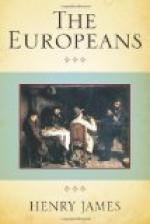“Voyons,” said the lady, putting out her hand.
He added a touch or two, and then gave her his sketch. She looked at it, but she went on with her idea of a moment before. “If a woman were to ask you to marry her you would say, ‘Certainly, my dear, with pleasure!’ And you would marry her and be ridiculously happy. Then at the end of three months you would say to her, ’You know that blissful day when I begged you to be mine!’”
The young man had risen from the table, stretching his arms a little; he walked to the window. “That is a description of a charming nature,” he said.
“Oh, yes, you have a charming nature; I regard that as our capital. If I had not been convinced of that I should never have taken the risk of bringing you to this dreadful country.”
“This comical country, this delightful country!” exclaimed the young man, and he broke into the most animated laughter.
“Is it those women scrambling into the omnibus?” asked his companion. “What do you suppose is the attraction?”
“I suppose there is a very good-looking man inside,” said the young man.
“In each of them? They come along in hundreds, and the men in this country don’t seem at all handsome. As for the women—I have never seen so many at once since I left the convent.”
“The women are very pretty,” her brother declared, “and the whole affair is very amusing. I must make a sketch of it.” And he came back to the table quickly, and picked up his utensils—a small sketching-board, a sheet of paper, and three or four crayons. He took his place at the window with these things, and stood there glancing out, plying his pencil with an air of easy skill. While he worked he wore a brilliant smile. Brilliant is indeed the word at this moment for his strongly-lighted face. He was eight and twenty years old; he had a short, slight, well-made figure. Though he bore a noticeable resemblance to his sister, he was a better favored person: fair-haired, clear-faced, witty-looking, with a delicate finish of feature and an expression at once urbane and not at all serious, a warm blue eye, an eyebrow finely drawn and excessively arched—an eyebrow which, if ladies wrote sonnets to those of their lovers, might have been made the subject of such a piece of verse—and a light moustache that flourished upwards as if blown that way by the breath of a constant smile. There was something in his physiognomy at once benevolent and picturesque. But, as I have hinted, it was not at all serious. The young man’s face was, in this respect, singular; it was not at all serious, and yet it inspired the liveliest confidence.
“Be sure you put in plenty of snow,” said his sister. “Bonte divine, what a climate!”
“I shall leave the sketch all white, and I shall put in the little figures in black,” the young man answered, laughing. “And I shall call it—what is that line in Keats?—Mid-May’s Eldest Child!”




